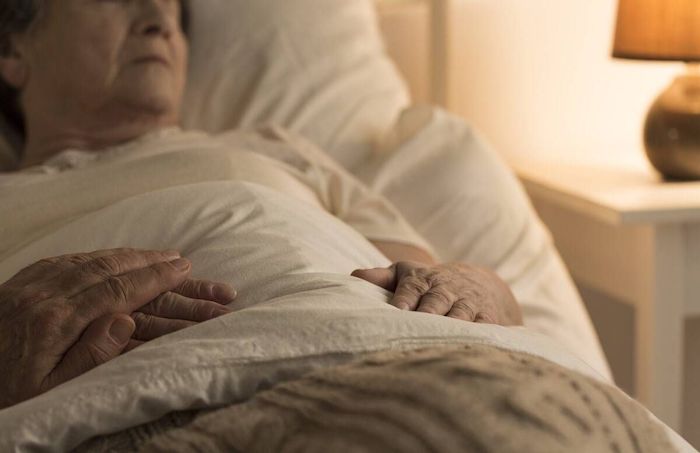
By Belinda Weber
Many people living with the later stages of dementia may not eat or drink. They may also develop dysphagia, which prevents them from swallowing effectively. How long a person can live without food and liquids varies, but doctors believe that sufficient end of life care may help improve their quality of life.
Dementia refers to a group of neurocognitive conditions that can permanently damage the brain. Alzheimer’s disease is the most common type, accounting for between 60% and 80% of dementia cases, according to the Alzheimer’s Association.
This article explains why someone living with dementia may stop eating and drinking. It also suggests ways carers can support them.
There are many reasons a person may stop eating and drinking. As a neurocognitive disorder progresses, most people become less active and do not need to consume as many calories.
According to the National Foundation of Swallowing Disorders, at least 45% of people living with dementia also experience dysphagia, which refers to difficulty swallowing. This can cause a person to be unable to consume adequate nutrition and liquids.
People living with dementia may also notTrusted Source be as diligent about their oral hygiene as they once were. This can cause them to have sore mouths, teeth with infections, or ill-fitting dentures.
Another reason may be that the damage in the brain has spread to the hypothalamus, the area that regulatesTrusted Source food intake. Alternatively, it could be that the person no longer recognizes things as food or forgets about eating.
Age can also play a part as the muscles involved in swallowing lose mass, resulting in a loss of strength and range of motion. The person may feel as if they are choking on food or cannot move it out of their mouth.
No one can say for sure how long someone can survive without eating or drinking, as it involves many factors. These include the person’s age, overall health, and how well their immune system can fight infections.
If someone has dysphagia, this can indicate that their neurocognitive disorder is progressing, as dysphagia usually occurs in the later stages. This increases the risk of a person inhaling food or liquid, leadingTrusted Source to chest infections.
While it is impossible to predict exactly how long someone can live without eating or drinking, having dysphagia can mark the beginning of end of life careTrusted Source.
People living with a neurocognitive disorder may benefit from end of life care for days, weeks, months, or years.
Artificial nutrition and hydration (ANH) is a procedure where doctors deliver nutrients and fluids intravenouslyTrusted Source into a person’s body via a tube. This tube runs into the stomach from the nose or a device fitted into the stomach.
However, these doctors need to administer these treatments in a medical setting, and many people with a neurocognitive disorder find the experience distressing. Some individuals may try to remove the tubes.
Doctors do not agree about recommending ANH for people living with late stage dementia as it is unclear whether it provides any overall benefits.
The American Speech-Language-Hearing Association notes that tube feeding does not improve the quality of life of a person with a diagnosis of dementia. Additionally, it states that tube feeding does not reduce their risk of developing a chest infection.
The Alzheimer’s Association recommends people living with a neurocognitive disorder plan their late stage care while they can still express themselves and make decisions. This can include whether or not they want ANH.
When someone living with dementia is nearing death, they tend to deteriorate more rapidly. They may develop incontinence and agitation.
According to the United Kingdom’s Alzheimer’s Society, signs that death is near for someone living with dementia include:
- loss of consciousness
- irregular breathing
- restlessness
- rattly sound in the chest
- cold hands and feet
A 2019 study listed pneumonia as the cause of death for 50%Trusted Source of people who required hospital care due to dementia.
Doctors recommend helping someone eat and drink for as long as they can, even if they eat in small amounts. The Alzheimer’s Association suggests:
- offering soft foods
- thickening liquids with cornstarch or unflavored gelatin
- alternating bites of food with sips of drink
- offering sherbet or ice cream
- serving finger food if someone has difficulties using cutlery
- helping the person sit in an upright and comfortable position
Many people living with a neurocognitive disorder may stop eating and drinking. This may be due to infections, but it may also result from individuals experiencing swallowing difficulties.
Swallowing difficulties, or dysphagia, often indicates that the person’s neurocognitive disorder is progressing and may have reached the later stages.
Doctors believe that the person’s body adjusts to the reduced food and liquid intake and that people do not feel hunger or thirst.
Swallowing difficulties increase the risk of inhaling food particles or fluids, which can lead to chest infections, including pneumonia.
Complete Article ↪HERE↩!






